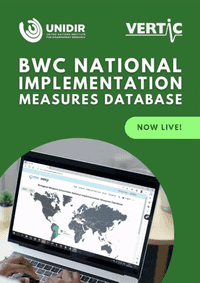UNIDIR/VERTIC Biological Weapons Convention National Implementation Measures Database
[National Implementation Measures Database]
The Biological Weapons Convention (BWC) National Implementation Measures Database is a resource that compiles national legislation, regulations, and other relevant policies aimed at State Parties' obligations under the BWC. The goal of the tool is to share best practices and help States and other stakeholders learn from the diversity of implementation approaches worldwide. The database also serves as a confidence-building tool by publicly sharing information to build trust and verify compliance with the BWC.
SUMMARY
The Biological Weapons Convention (BWC) National Implementation Measures Database is a resource maintained by UNIDIR and VERTIC that compiles national legislation, regulations, and other relevant policies aimed at State Parties' obligations under the BWC. The goal of the database is to promote transparency, compliance, and international cooperation under the BWC framework.
All information in the BWC National Implementation Measures Database is collated from publicly available official sources and, where possible, reviewed in collaboration with the relevant State Party. Implementation measures can be filtered for specific topics, including: Transport requirements; Export control lists; Domestic control lists; Biosafety and biosecurity requirements; Measures for personnel; Cybersecurity; Research codes of conduct and guidelines; Oversight of dual-use research; BWC National Contact Point; International Cooperation offers; and Prohibitions. Specific details and additional resources for each topic areaa are available in each country profile.
The BWC National Implementation Measures Database serves a wide audience. For instance, policymakers can use the database to benchmark their national legislation against international standards, identify gaps in their biosecurity frameworks, and adopt best practices from other countries. Researchers can analyze the data to study the effectiveness of various biosecurity measures and contribute to the development of more robust biosecurity policies. Organizations involved in biosecurity can leverage the database for monitoring and evaluation purposes, ensuring that States Parties are upholding their commitments under the BWC. In this way, the database also serves as a confidence-building tool by publicly sharing implementation measures to build trust and verify compliance with the BWC.


..png)
